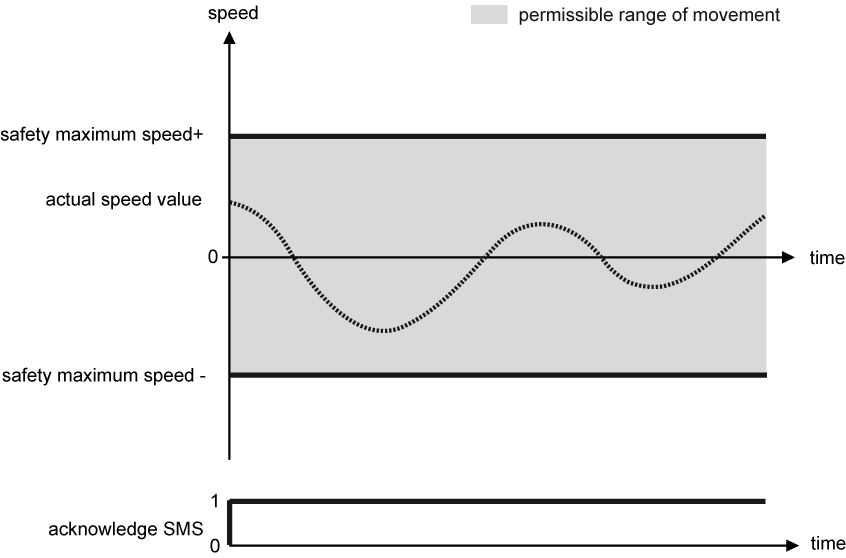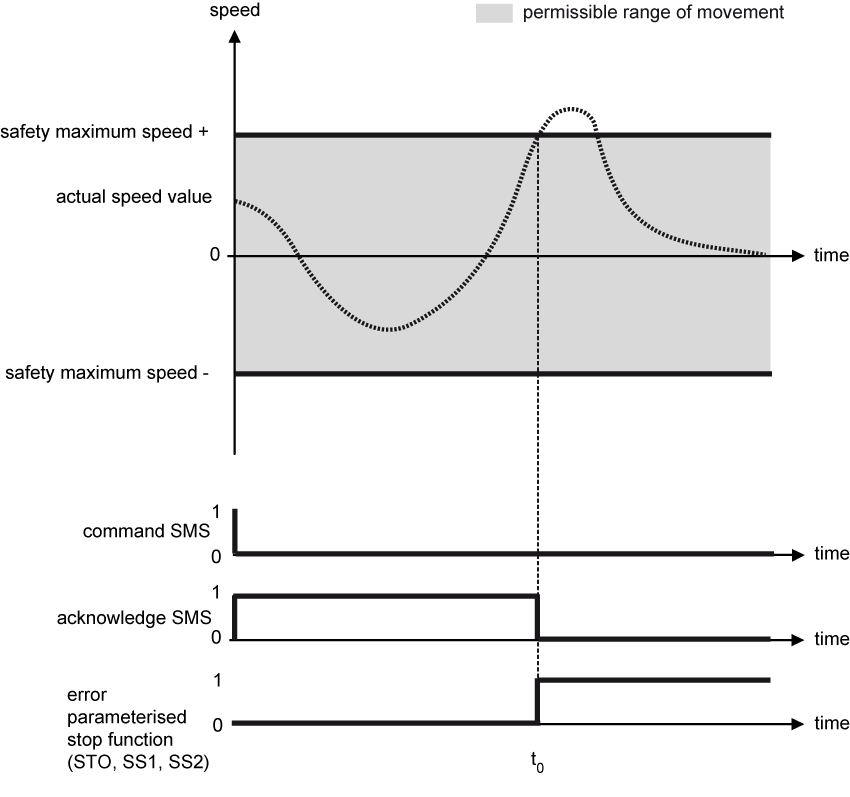Safe maximum speed (SMS)
Properties
- Special case of the SSR safety function according to DIN EN 61800-5-2:2008-04
- Safe monitoring of the actual speed value (2-channel)
- Parameterisable stop function in case of error
Description
The SMS safety function belongs to the normal operation category. The SMS safety function is automatically started after the system booting. It monitors whether the actual speed value meets the parameterised permissible speed range.
|
|
The normal operation function 'Safe maximum speed (SMS)' is always active and can not get deactivated. |
|
|
The monitoring of the safe maximum speed can be "switched off" in principle by setting the Prm67 'SMS safe maximum speed', N(max,SMS), to its maximum value. In this case, you must consider that the safe maximum speed directly governs the steepness of the braking ramps of the stop fuctions SS1 and SS2 as well as the safe operation modes SSR and SLS. |
Example 1: Drive movement in the permissible range of movement

Reaction in case of an error
As soon as the safety function detects a deviation from the limits of the controlled values, the drive executes a safe stop function that has previously been set by parameter ('Safe torque off (STO)', 'Safe stop 1 (SS1)' or 'Safe stop 2 (SS2)').
|
|
|
|
|
Danger to life due to unexpected movements! The drive will be torque-free in the status 'Safe torque off (STO)', in case of mains failure or in case of faulty drive controller. External application of force on the drive axis may result in life-threatening movements (e.g. hanging axes can fall down). Steps to prevent:
|
|
|
|
|
|
Danger due to unexpected stop function! If there are different error reactions projected for the safety functions, an unexpected final state can occur in case of error. Example: Steps to prevent:
|
|
|
The reaction time of the drive in case of error is prolonged by the reaction time of the parameterised stop function! |
Example 2: Drive movement deviates from the permissible speed range

|
Time t |
Explanation |
|---|---|
| t < t0 |
The SMS safety function is automatically started after the system booting. It monitors whether the actual speed value meets the parameterised permissible speed range. |
|
t = t0 |
The safety function detects that the maximum velocity has been exceeded, switches the drive into the parameterised stop function and sets the error bit. The SMS acknowledgement bit is reset. |
|
t ≥ t0 |
The behaviour is dependant on the parameterised stop function. |
Acknowledge an error with "Clear error"
As soon as an active safety function detects a deviation from the limits of the monitored values, the drive is set to the intended stop function. The error bit (FSoE status bit 7) is set and the acknowledgment of the safe status is withdrawn.
With the 'Clear error' signal (FSoE control bit 7 or the 'Clear error' command in the drive controller) the
error status ist acknowledged (deleted). If during and after the 'Clear error' the start signal from a previous safety function is still active and no other changes to the settings of the safety function have been made, the safety function restarts and also transition times (if available) work again.
Parameters



